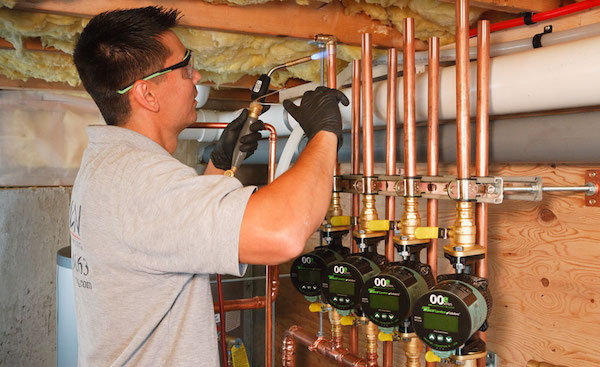The leading provider of technician-first software for contractors announces the promotion of Enterprise Account Executive Austin Piazza and Account Executive Lindsey Fisher XOi, the leading provider of technician-first smart technology for commercial and residential field service companies, announces two new sales promotions as the company continues to build opportunities and provide support for contractors and Read more
Smart Technology

The leading provider of technician-first software for contractors announces the promotion of Enterprise Account Executive Austin Piazza and Account Executive Lindsey Fisher
XOi, the leading provider of technician-first smart technology for commercial and residential field service companies, announces two new sales promotions as the company continues to build opportunities and provide support for contractors and field service business owners.
In their new roles, Enterprise Account Executive Austin Piazza and Account Executive Lindsey Fisher are responsible for developing and enhancing relationships and educating the industry about XOi’s unique capacity to help contractors solve the skilled trades gap and grow their business.

XOi, the leading provider of technician-first field service technology, has promoted Enterprise Account Executive Austin Piazza (left) and Account Executive Lindsey Fisher (right) to develop and enhance customer relationships and educate the industry about XOi’s unique capacity to help contractors solve the skilled trades gap and grow their business.
“At XOi, we’re shaping the future of field service,” said Aaron Salow, founder and CEO of XOi. “Our sales team is essential to our mission. They connect our technology with the contractors and technicians who are using it to transform the industry. Austin and Lindsey have proven their commitment and expertise, and we’re looking forward to seeing them continue to excel and drive results for XOi and our customers.”
Piazza, a University of Alabama graduate, joined XOi in 2019. He has more than a decade of management, technology and business development experience. As an enterprise-level account executive, Piazza is focused on connecting large businesses with XOi’s solutions.
“I’m passionate about helping clients discover the right software solutions for their specific needs,” Piazza said. “XOi has established itself as the right tool to empower technicians in the field so they can operate more efficiently and increase revenue.”
Fisher, who also graduated from the University of Alabama, joined XOi in 2020. She has extensive sales experience in SaaS and technology.
“I’m excited to take this next step with XOi,” Fisher said. “I truly believe XOi can deliver meaningful, measurable results for contractors by addressing the skilled trades labor shortage and making their companies more efficient.”
XOi users report, on average, a 20% reduction in the amount of time it takes to complete tasks, an additional $1.4 million in new replacement and preventive maintenance contract revenue, and a 40% reduction in second truck rolls.
For more information about XOi, visit https://xoi.io.

It doesn’t seem so long ago we were fending off the “green” movement that was being force-fed into the vocab of working contractors. From green building to green technology, greenwashing was so prevalent that really the only “green” contractors were concerned with was the one they were chasing every day—a profit. But alas, a new Read more
It doesn’t seem so long ago we were fending off the “green” movement that was being force-fed into the vocab of working contractors. From green building to green technology, greenwashing was so prevalent that really the only “green” contractors were concerned with was the one they were chasing every day—a profit.
But alas, a new word has dominated the marketing lexicon—“smart.” Smart cars, smart phones, smart homes and yes, even smart pumps. “The problem is they’re not that smart,” says John Barba, contractor training manager, Taco Comfort Systems. “I’ve heard people who you’d think would know better say idiotic stuff like ‘these pumps do the thinking for you,’ and ‘they take the thinking out of it,’” says Barba.

Image Credit: Noven; Bethesda.net
How about giving credit to the users who actually interact with such devices? “The thing that separates the professional from the DIY’er or the handyman is his or her ability to think and their understanding of systems. That’s why people hire professionals, and that’s why our profession is so valuable. When it comes to systems and components, the professional is the smart one,” says Barba
“The professional knows what he’s holding in his hands, why he’s using it and what impact it’s going to have on the overall system performance. There’s not a pump made that can replace what the pro knows. The machines haven’t taken over yet,” continues Barba.
Intelligent Systems
If the integration or connectivity of disparate components to a holistic, communicative system is considered smart, then I’m buying in. Why not just say that in the first place? Because it’s not market-y, and it’s too long for a tagline. Okay, then the evolution of homebuilding can be categorized as being smart or intelligent because the integration of, say, lighting, security, home entertainment, etc., can be accessed from the convenience of your smart phone (more on that later). But I’d say that is more a matter or convenience than smarts.
In fact, as part of these communicative devices, perhaps on a broader, commercial stage, we are witnessing new phrases popping up such as the Internet of Things (IoT). According to Sokwoo Rhee, former associate director of the Cyber-Physical Systems Program at the National Institute of Standards and Technology (NIST) from 2014 to 2021, IoT can be described as the advancements in sensors and communication technologies that enable us to collect data which was not previously practical; the explosive increase of the amount of collected data enabled us to perform analytics which was not previously practical or meaningful; and the advancements in data analytics that will enable us to better control and optimize the systems to benefit our daily life. Again, I can buy into that.
Remember when cell phones were labeled smart phones? I think they still are. It’s 2007 and my fancy handheld device can make calls and perform functions as a computer. Well guess what? Today, they are just considered phones. And, if they don’t perform almost any function you can think of, well, then perhaps they are just dumb.
And, oh yeah, what makes a smart car? Good gas mileage? Actually, the term Smart Car came from a venture between watchmaker Swatch and Mercedes-Benz, with Smart standing for Swatch Mercedes Art, a branding stroke of genius. Its small stature was designed for city driving with big gas savings and easy maneuverability, with not-so-good safety ratings, I’d imagine. Debuting in the U.S. in 2008, last I read, it was discontinued in 2019.
And back to those smart, magical pumps? “The only word I hate more than ‘smart’ is ‘magic,’” says Barba. “Anyone who says something like that really doesn’t know how ECM circulators really work, or how they interact with systems. No matter how ‘smart’ people claim these things are, you can’t get away from the fundamentals of circulators. These things have performance—or ‘control’ curves—and the system still has a system curve,” says Barba.

According to Barba, there’s no such thing as magic, and the only circulator that can even come remotely close to sizing itself is the Taco VT2218—it’s a Delta-T circulator and varies its speed to maintain a fixed delta-T in the system.
“And I don’t care how many lights and buttons you put on the circulator, you can’t change the fact that when you have a fixed performance curve—as every Delta-P variable speed circulator has—the system has to work where the system curve intersects the control curve. If it’s a zone valve system, speed and flow will change as zone valves open and close, but it still works on the selected control curve. If it’s a zone pump system, a Delta-P circulator won’t vary its speed because there’s nothing in a zone that would create a change in pressure differential. It goes one speed and that’s it. That’s not what I’d call smart.
“Now, that doesn’t mean you shouldn’t use a Delta-P pump as a zone pump. You should—it’ll do some pretty cool things for you provided it’s set up properly. And for that, you need a smart installer who understands what these circulators do, what they don’t do and how they interact with the system,” says Barba.
“Just because a circulator is variable speed, that doesn’t make it magic. This isn’t Hogwarts and you’re not Harry-freaking-Potter.”
What’s my point in all of this? Dig deeper, educate yourself, rely on your experience and knowledge, and don’t rely on marketing taglines such as Smart or Green to sell you completely on something.
